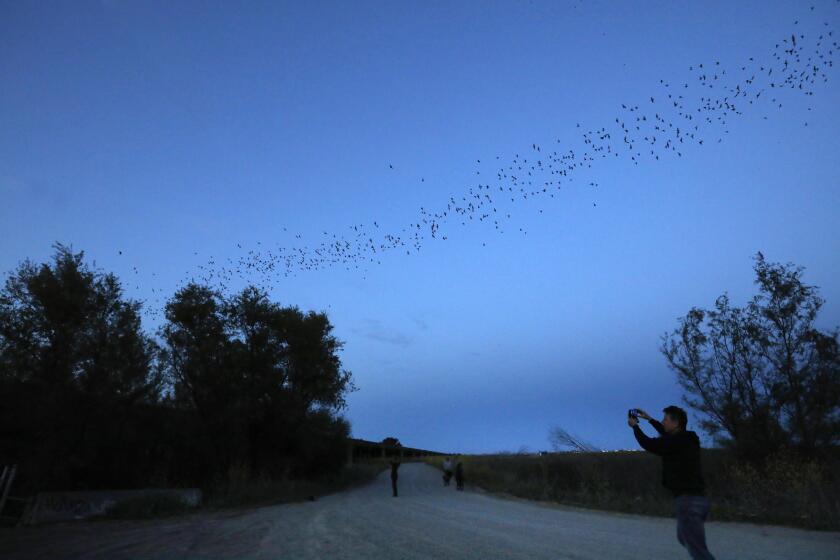Care at Long Beach VA Hospital Blasted : Medicine: Federal investigation finds ‘significant problems,’ low morale at facility. Five psychiatric patients committed suicide over 14 months.
A federal investigation of a Long Beach veterans hospital hit by a spate of patient suicides concluded that the facility had “significant problems” with the quality of care and had “serious morale problems” that may have contributed to the deaths.
The highly critical report released Thursday by the Department of Veterans Affairs in Washington found that the program set up to assure high-level care at the Veterans Affairs Medical Center in Long Beach was “deficient.”
Supervisors on the psychiatric ward, the report said, failed to notice that they were losing one patient to suicide every three months. Five patients killed themselves in 14 months.
“This reviewer finds it difficult to imagine a hospital in which there had been deaths by suicide at almost regular three-month intervals and in which (top level administrators) would not be involved,” Dr. Donald E. Widmann, a San Francisco psychiatrist, wrote after a four-month review of medical records, interviews with staff and visits to the troubled psychiatric ward.
The investigation was ordered by the secretary of Veterans Affairs after The Times reported in May that five patients had committed suicide between March 22, 1989, and April 17, 1990.
Inspectors focused on the hospital’s locked ward where acutely ill psychiatric patients are supposed to be kept under constant or near-constant watch. It was there that two of the patients, who had been identified as suicidal, hanged themselves.
The locked ward itself had “serious morale problems” and the staff had divided itself into “camps,” the report concluded. The chief of psychiatry was not on speaking terms with the locked ward chief. The locked ward’s head nurse did not get along with some of her staff.
And allegations of “serious misconduct” leveled by a chief physician and head nurse prompted an internal investigation, the results of which are pending, the report said.
Widmann called the ward “a tight little island” with a therapeutic environment sometimes hostile to patients who did not “fit in.” He said the tensions on the ward could have contributed to the five deaths.
Hospital spokesman Gabriel Perez said administrators were reviewing the findings and were unprepared to comment in detail. He noted, however, that the hospital has already submitted a plan of correction that investigators said should make the ward sound once implemented.
Many of the corrections, including closer monitoring of patients and strengthening the review of patient care, are already in place, Perez said.
“The quality of patient care to veterans has been and will continue to be our foremost priority,” Perez said. “We have submitted a plan of action that, when fully implemented, should provide a more safe environment for our psychiatric patients and a better overall quality-assurance program.”
Widmann, a private consultant hired by the VA to assist in the investigation, was the only psychiatrist involved in the review, which also included two VA nurses and an administrator.
Perez said the hospital will correct remaining problems before investigators return to make sure the facility has been brought up to standards--probably in a few months. Although government-run hospitals are not subject to fines, violation of medical standards could mean repercussions from Washington, officials said.
In their 30-page report, the inspectors concluded that the hospital properly investigated the five deaths, but failed to notice what was becoming a pattern. Four of the deaths occurred on the hospital’s grounds and one in the home of a man who was allegedly refused care. All five state mental hospitals recorded as many suicides over two years.
One man wandered away from nurses and jumped off a hospital roof; two patients hanged themselves with bed sheets and a fourth shot himself at his desert home. When a troubled 27-year-old Marine hanged himself on the locked ward with the laces from his combat boots, staff members began to complain that the unit was mismanaged and dangerous.
“For serious incidents such as suicides, management also had a responsibility to look beyond the immediate incident and to determine if the circumstances . . . suggested a more widespread patient care deficiency,” Widmann wrote.
Some reviews of the suicides took place months after the deaths occurred, and the results were withheld from the quality-assurance team--a watchdog group upon which every hospital relies to ensure that patients are safe and well cared for.
“Patient care suffers when the staff is divided and cannot function as a team,” Widmann wrote, noting that taking care of suicidal, homicidal, violent and gravely ill patients is demanding enough without added morale problems.
The locked ward, which is part of the psychiatric unit at the mammoth 1,368 bed facility, was shut down last May for a $170,000 renovation and six-week retraining of its staff.
But investigators who surveyed the unit after it reopened said it remains troubled today. Doctors weed out the sickest patients and transfer them to private psychiatric hospitals for care, saying the VA ward is ill equipped to handle them, the report said. In the past, such transfers were said to be rare.
Investigators questioned the qualifications of the current leadership, noting that more than $200,000 was spent transferring patients to private hospitals in the first three weeks after the ward reopened.
“The current psychiatric intensive care unit is an intensive care unit in name only and is not currently serving the population for which it was intended,” Widmann said.
More to Read
Sign up for Essential California
The most important California stories and recommendations in your inbox every morning.
You may occasionally receive promotional content from the Los Angeles Times.









